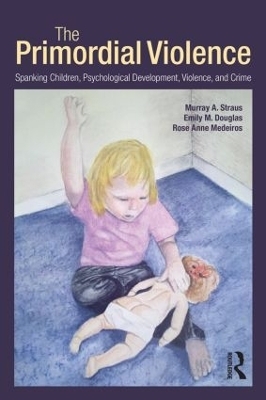
The Primordial Violence
Routledge (Verlag)
978-1-84872-953-7 (ISBN)
Why do parents hit those they love? What effect does it have on children? What can be done to end this pattern? These are some of the questions explored in The Primordial Violence. Featuring longitudinal data from over 7,000 U.S. families as well as results from a 32 nation study, the book presents the latest research on the extent to which spanking is used in different cultures and the subsequent effects of its use on children and on society. Evidence that shows the relationship between spanking and the subsequent slowing of cognitive development and increase in antisocial and criminal behavior is shown. Both cross-sectional and longitudinal studies are explored in an accessible fashion. An abundance of high quality research has produced findings that are highly consistent from study to study which show that spanking is a risk factor for aggressive behavior and other social and psychological problems. Because of these findings, the authors argue for policy changes and recommend a drastic reduction in the use of spanking. Policy and practical implications are explored in most chapters.
The Primordial Violence highlights:
The benefits of avoiding spanking such as the development of better interpersonal skills and higher academic achievement;
The link between spanking and behavioral problems and crime;
The extent to which spanking is declining and why despite the unusually high level of agreement between numerous studies which found harmful effects from spanking, most parents continue to spank.
Part 1 documents the worldwide use of spanking and why parents spank. The possible adverse effects of spanking on children’s behavior and academic achievement, and the potential for violence and criminal behavior in later life, are explored in Parts 2, 3, and 4. Part 5 examines trends in spanking, and suggests what can be done to lower the percent of parents who spank. Contradictory opinions about whether to spank are explored. The book concludes with a call for change in this aspect of parenting which will have profound benefits, for the children and families involved, and society as a whole.
Intended for a general audience of readers who are interested in child development and parenting and for advanced undergraduate and/or graduate courses in child abuse, family violence, juvenile delinquency, criminal behavior, social development, sociology of the family, or parenting and family relations taught in psychology, human development, family studies, criminology, education, social work, sociology, and social policy.
Murray A. Straus is Professor of Sociology and founder and Co-Director of the Family Research Laboratory at the University of New Hampshire. Emily M. Douglas is Associate Professor of Social Work at Bridgewater State University. Rose Anne Medeiros is Quantitative Methodologist in the Department of Sociology at Rice University.
Part I: Prevalence and Social Causes of Spanking 1. The Social and Scientific Context of Research on Spanking. 2. Corporal Punishment In The United States. 3. Spanking In World Perspective. 4. There was An Old Woman Who Lived In A Shoe. 5. Approval Of Violence And Spanking Children. Part II: Spanking and Child Behavior Problems 6. The Boomerang Effect of Spanking. 7. Impulsive Spanking, Never Spanking And Child Well-Being. 8. The Child-to-Mother Bond and Deliquency. 9. Spanking and Risky Sex. Part III: Spanking and Human Capital 10. Mental Ability. 11. College Graduation. Part IV: Spanking and Human Capital 12. What Explains The Link Between Spanking and Assaulting a Partner? 13. Assault and Injury of Dating Partners by University Students in 32 Nations. 14. Cultural Context & The Relation of Spanking Crime. 15. Spanking High Risk Children and Adult Crime. 16. Sexual Coercion and Sexual Assault. Part V: Social Change and Trends In Spanking 17. The Decline in Approval of Spanking. 18. Why Everyone Spanks Toddlers and What To Do About It. 19. Implications for Crime and Violence in Society. 20. Obstacles to Accepting the Evidence. 21. A World Without Spanking.
| Erscheint lt. Verlag | 23.9.2013 |
|---|---|
| Zusatzinfo | 31 Tables, black and white; 75 Illustrations, black and white |
| Verlagsort | London |
| Sprache | englisch |
| Maße | 152 x 229 mm |
| Gewicht | 860 g |
| Themenwelt | Geisteswissenschaften ► Psychologie ► Allgemeine Psychologie |
| Geisteswissenschaften ► Psychologie ► Entwicklungspsychologie | |
| Geisteswissenschaften ► Psychologie ► Familien- / Systemische Therapie | |
| Medizin / Pharmazie ► Medizinische Fachgebiete ► Psychiatrie / Psychotherapie | |
| Recht / Steuern ► Strafrecht ► Kriminologie | |
| Sozialwissenschaften ► Soziologie ► Mikrosoziologie | |
| ISBN-10 | 1-84872-953-7 / 1848729537 |
| ISBN-13 | 978-1-84872-953-7 / 9781848729537 |
| Zustand | Neuware |
| Haben Sie eine Frage zum Produkt? |
aus dem Bereich


